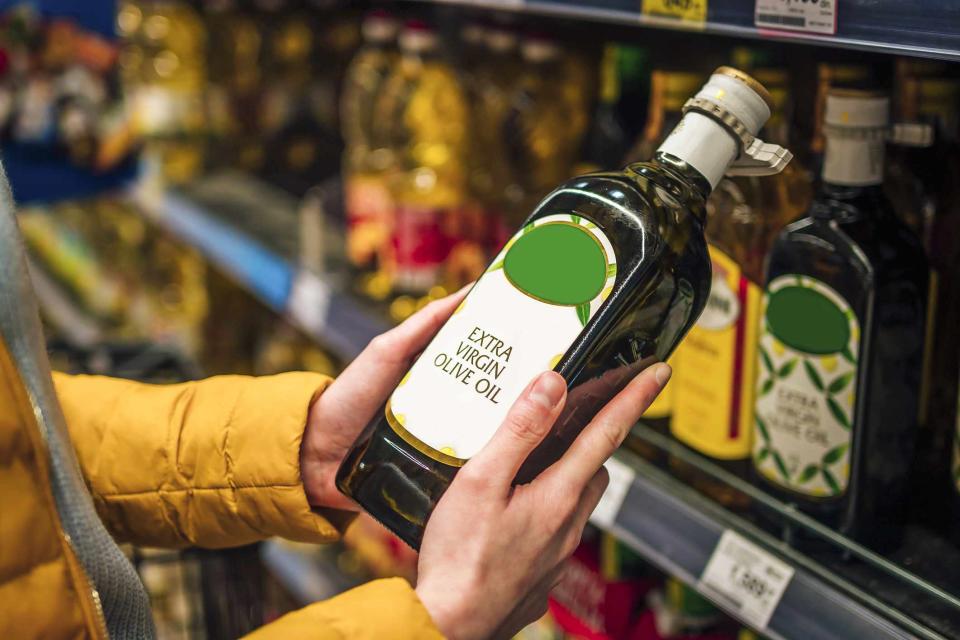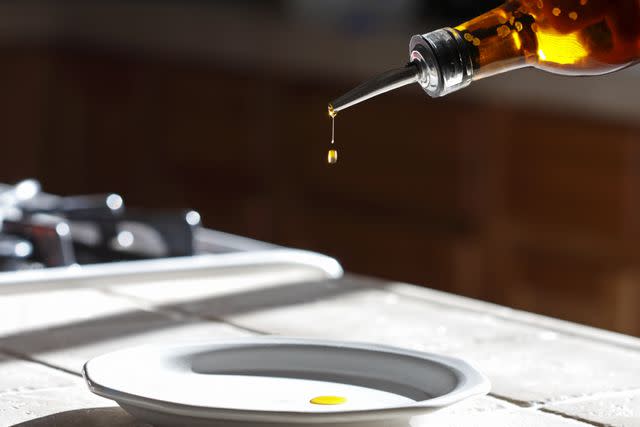Should You Try The “Fridge Test” To Tell If Your Olive Oil Is Fake?
Could your EVOO be hiding other things?

Getty Images/LordHenriVoton
Olive oil is nothing short of a healthy pantry staple—both for its use while cooking on the stovetop or in the oven, as well as its versatility when used on its own for dressing salads and drizzling over dips. The rich, peppery flavor and pure quality is unmatched, allowing a good extra virgin olive oil to be a standout ingredient unlike other oils.
However, once it became asserted that some bottles of extra virgin olive oil on the market could be counterfeit in some way, people started wondering just how to tell if their extra virgin olive oil was, in fact, real or fake—particularly since they are paying for it and ingesting it. While that can be a difficult task, some home cooks have tried an at-home method, called the “olive oil fridge test.” Here’s how it works, and if it works, for telling the authenticity of your EVOO.
Related: What's The Difference Between Olive Oil And Extra Virgin Olive Oil?

What Is the “Olive Oil Fridge Test?”
The basis of this testing method (which has been popularized on social media and television) stems from the fact that authentic EVOO should be composed of mostly monounsaturated fats, which would coagulate and solidify at refrigerated temperatures, unlike polyunsaturated oils such as vegetable, nut, and seed oils. (These lesser-quality oils have been accused of being used to dilute some olive oils.)
Therefore, by placing your bottle of extra virgin olive oil in the refrigerator overnight, it should theoretically solidify, showing that your bottle is made up of monounsaturated olive oil and nothing else. If it does not solidify, it would potentially indicate that there might be polyunsaturated oils, such as vegetable or seed oils, mixed in. While the simplicity of this "test" might be appealing, it still leaves much to desire in terms of proof for those who seriously want to know about the authenticity of their olive oil.
While if you perform this test on a bottle of what appears to be an authentic oil, and it works, you might be tempted to rest assured—is the olive oil fridge test actually reliable? Perhaps not so much.
Related: Are You Using Your Olive Oil Wrong?
Does the “Olive Oil Fridge Test” Work?
While the premise of the “olive oil fridge test” seems to make sense at first glance, the makeup of olive oils can be drastically different depending on where they come from and how they were produced. For example, some producers filter out the natural waxes in olive skin to help “winterize” the olive oil to be less prone to coagulating, even though it could be 100 percent authentic, thus nullifying the test’s veracity.
In short, the “olive oil fridge test” is not proven to work when telling true authenticity, and most olive oil producers or experts would urge caution, instead recommending other ways to tell if your EVOO is real or fake.
Related: What’s The Difference Between Olive Oil And Vegetable Oil?
Other Ways To Tell If Your Olive Oil Is Real
Check the Harvest Date and Location
As a rule of thumb, most producers recommend that a harvest or best-by date should be stated on the bottle, and if the olive oil has a best-by date no more than 24 months from bottling, it is a good indicator that it is fresh and not degraded of flavor and quality. Additionally, if there is no indicator of where your olive is from or it does not denote “extra virgin” on the bottle, that might be a red flag.
Check the Bottle Color
While certainly not the most foolproof method, it is common knowledge that EVOO is best stored and preserved in darker (such as dark green) or opaque glass bottles. Therefore, start by staying away from clear plastic bottles boasting authentic olive oil, because most producers would not prefer for olive oil to be stored that way due to sunlight speeding up degradation. It's not an obvious answer, but a good place to start.
Buy Local
A great way to know exactly where your olive oil is from and what it is made of is to purchase local olive oil. While not as prevalent in all states, you might be able to find a local producer at your farmers’ market somewhere in your region. For example, in Texas you can stock up on oils at Texas Hill Country Olive Co. or Texas Olive Ranch. In Georgia, you can find small-batch olive oil from Georgia Olive Farms. (They also ship.) Ask questions about local producers' processes, and feel good about supporting local businesses!
For more Southern Living news, make sure to sign up for our newsletter!
Read the original article on Southern Living.

